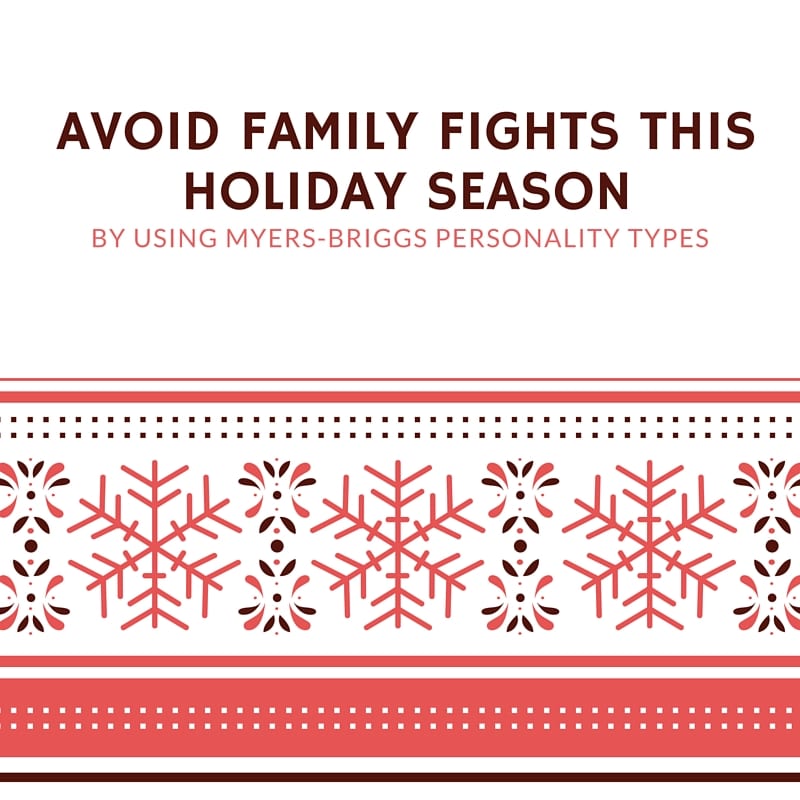The holidays are supposed to be a time of relaxation, good food and family fun, right? Well that isn’t always the case. Google searches for “family fights” and related search terms always increase right around Thanksgiving and the Winter holidays. Expectations and stress can be high around the holidays and if you or a loved one is living with a mental health disorder that can make things even more tense.Why do these holiday fights happen in the first place and what can be done about it? I believe most holiday fights have to do with misunderstanding and assumptions. Few people take the time to really learn each of their family members’ preferences. This often leads to unfair assumptions about why your relatives behave a certain way. The Myers-Briggs Personality Indicator can give you the tools you need to better understand your relatives and have a more peaceful holiday season.
There are 16 different personality types in Myers-Briggs Personality Indicator which are based on 2 options in 4 different categories of personality. This personality typology is based on the early work Carl Jung to understand the different ways people behave and interact with each other. Remember there is NO perfect personality type, they all bring value with their unique strengths. I will go over each personality category with a few questions you can ask your loved ones to find out more about their personalities. Find out more about Myers-Briggs Personalities and take a full personality test.
Introverts vs Extroverts
Introverts and extroverts can rub each other the wrong way because of how different the ways they boost their mental energy are from each other. Extroverts need to engage with the world around them to get their energy levels up while introverts need alone time for the same reason. This often causes conflicts when extroverts plan too many social activities or outings with little or no breaks for their introverted family members to get some quiet time. Introverts might also cause issues by assuming their loved ones will be happy at home entertaining themselves. Before you label your introverted cousin as a “party-pooper” or your extroverted sister as an “attention seeker” take the time to learn about how they prefer to socialize and how you can find a middle ground.
1.When you are tired, what do you normally do to boost your energy?
Solitary/quiet activities = introverted Social/high energy activities = extrovert
2. Do you have a small circle of close friends or a lot of casual friends and acquaintances?
Small group of friends = introvert Large social network = extrovert
Sensors vs Intuitives
Sensors and Intuitives refer to the two ways people process information. Sensors like to deal with the information that is in the here and now. They also like details and hate leaving anything up to interpretation. Intuitives on the other hand, focus on the big picture and feel held back by too much instruction or detail. A sensor sister might feel anxious when her brother tells her to “just bring anything” to Thanksgiving dinner as sensors prefer details and directions. A young intuitive son might feel overwhelmed if his father is constantly giving him instructions and advice as he tries to wrap presents for the first time. Also keep in mind that sensors are more likely to jump into a situation where intuitives like to hold back and analyze the situation first. To avoid conflict, carefully read your relatives’ reactions and take the time to learn who needs space and who likes detailed instructions.
1. Do you feel anxious or uneasy when you are given a task with little instruction or do you feel uneasy when you aren’t allowed to do things your own way?
Little instruction = sensor Your own way = intuitive
2. Are you a hands-on learner or do you like to think about things first then start the project?
Hands on = sensor Hang back and think = intuitive
Feelers vs Thinkers
This area of personality relates to how someone makes choices. Feelers use emotion to make decisions and thinkers use logic or rational thought to make decisions. Often times, a lot of fights revolve around one family member not understanding the life choices of the other family member(s). A thinker uncle might scoff at the impracticality of his feeler nephew’s career as an artist or a feeler mother might feel unwanted when her thinker daughter chooses to move farther from home to live closer to work. To avoid conflict around these issues, it’s best to keep a calm non-judgement stance and try to connect and empathize with that particular relative about the choice they made. The uncle can learn that his nephew chose to be an artist because he feels it will bring him the most happiness. The mother can learn that her daughter moved away not because she doesn’t love her parents but because she thinks it is more practical to live closer to work.
1. Do you think people make the most mistakes when they don’t use logic or when they aren’t compassionate?
Compassionate = feeler Logic = thinker
2. When faced with a tough choice, do you weigh the pros and the cons or follow your heart?
Heart = feeler Pros and cons = thinker
Perceivers vs Judgers
Nowadays we think of “judging” as someone looking down on someone else unfairly but that is not what the term means in Myers-Briggs. Personality typologists use it to refer to one’s preference structure and organization. The holidays revolve around plans and some people have an easier time organizing events than others. Perceivers like to go with the flow and keep their options open, often feeling bogged down by too much structure. Judgers, on the other hand, are very good at seeing into the future and planning events, many of them enjoy it. Issues can occur when perceivers feel like they are being ordered around by other people in the family or when judgers are expected to “wing it” or change plans at the last minute.
To find harmony between the two, be sure to give judgers some power over the plans but keep some areas flexible for their perceiver relatives. A judger wife might demand that everyone in the family is in the car by 9:00 am, where a perceiver husband will prefer to leave when he is ready. A good compromise is to have the wife set up a guideline such as “let’s leave between 9:00-9:30 am” so that she will have the structured timeline she likes while the husband has the flexibility he prefers.
1. Do you mind if I make the plans or would you prefer if I leave some of the organizing to you?
Gives you control over plans = perceiver Likes to organize = judger
2. Do you normally follow a tight schedule or do you prefer to deal with things as they come up?
Open schedule = perceiver Tight schedule = judger
Have a Happy and Mentally Healthy Holiday Season!
<p style=”text-align: center;”><strong>Subscribe to our e-newsletter for more mental health and wellness articles like this one.</strong>
SUBSCRIBE NOW
</p>
Recommended for You
- Living Well with an Eating Disorder - July 18, 2017
- Living Well with Borderline Personality Disorder - June 13, 2017
- 6 Things that Everyone Thinks are Signs of Mental Illness but Aren’t - May 16, 2017





